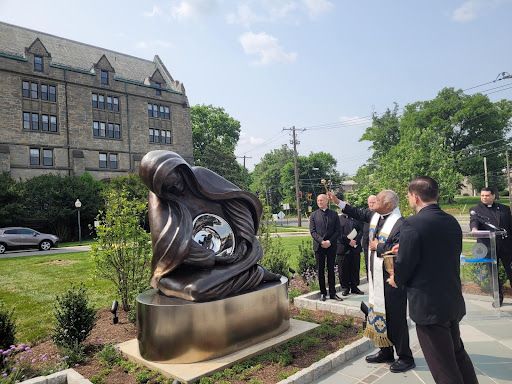
Vatican City, Apr 29, 2022 / 09:20 am (CNA).
Cardinal Seán O’Malley defended the independence of the Pontifical Commission for the Protection of Minors on Friday as the commission prepares to occupy a new position within the Roman Curia.
“One of the things that people obviously were concerned about and wanted to know about is what’s the independence of the commission now that it becomes part of the Curia,” he said at a press conference near the Vatican on April 29.
The American cardinal, who serves as the president of the safeguarding commission, underlined that Pope Francis “has assured us that … the commission will be independent.”
After the publication of the pope’s new apostolic constitution, Praedicate evangelium, which places the pontifical council within the Vatican’s Congregation for the Doctrine of the Faith (CDF), abuse survivor Marie Collins expressed concern that the reform could lead to the body losing its independence.
Collins joined the commission in 2014 but resigned in 2017, citing a lack of co-operation from Vatican dicasteries, specifically from the CDF, as one of the main reasons for stepping down.
O’Malley, the archbishop of Boston, insisted at the press conference that the commission would continue to “communicate directly to the Holy Father our recommendations and thoughts,” while working closely with the institution that will be known as Dicastery for the Doctrine of the Faith when the new constitution comes into effect in June.
Meeting with commission members earlier in the day, Pope Francis also expressed a desire for the body, which he instituted in 2014, to remain independent.
“The apostolic constitution marks a new beginning,” the pope said. “It put you in the Curia’s organization chart within that dicastery, but independent, with a president appointed by the pope. Independent. It is your responsibility to expand the scope of this mission in such a way that the protection and care of those who have experienced abuse may become normative in every sector of the Church’s life.”
Pope Francis added that he believed the commission’s collaboration with the Dicastery for the Doctrine of the Faith would enrich the commission’s work.
In the new constitution, the pope reorganized the internal structure of the Vatican’s doctrine office into two sections: a doctrinal section and a disciplinary section.
Father Andrew Small, the commission’s secretary, said that the body’s inclusion within the dicastery responsible for justice and discipline could make the Dicastery for the Doctrine of the Faith “a one-stop shop” for both protection, a proactive vision, and the consequences of wrongdoing.
He said that there had been a presentation by those responsible for drafting the apostolic constitution that provided a sense of the “theological understanding of why the commission, with this clear focus on safeguarding and protection, should be as close as possible to the department that focuses on justice and what is traditionally called the preservation of morals.”
“And that the commission will have a structural input in the administration of justice was made very clear during our meeting,” Small said.
The priest noted that there had been some preliminary conversations to see how the commission could access information and criminal processes, adding: “There’s no such thing as hidden justice.”
Pope Francis agreed to establish the Pontifical Commission for the Protection of Minors in 2013 as a papal advisory body to improve the Church’s norms and procedures for the protection of children and vulnerable adults.
The advisory group has been headed by O’Malley since its establishment. Other members include Father Hans Zollner, Juan Carlos Cruz, Bishop Luis Manuel Alí Herrera, and Sister Jane Bertelsen, among others.
In Pope Francis’ speech to the commission, he said that he was moving the commission within the dicastery that deals with clerical sexual abuse in part because “it was not possible to have a ‘satellite commission,’ circling around but unattached to the organization chart.”
The apostolic constitution will come into force on June 5, the Solemnity of Pentecost.
Pope Francis said: “I would like you to propose better methods to enable the Church to protect minors and vulnerable persons and to assist the healing of survivors, in the recognition that justice and prevention are complementary.”
“Indeed, your service provides a proactive and prospective vision of the best practices and procedures that can be implemented in the entire Church.”
If you value the news and views Catholic World Report provides, please consider donating to support our efforts. Your contribution will help us continue to make CWR available to all readers worldwide for free, without a subscription. Thank you for your generosity!
Click here for more information on donating to CWR. Click here to sign up for our newsletter.








Cardinal O’Malley’s work on the abuse file has always seemed admirable to me. But I was surprised to see his name listed among those present at a recent secret meeting that seemed, to me anyway, to have an aura of “the spirit of Vatican II” about it.